#he despises the written word and will attack anything that produces it
Explore tagged Tumblr posts
Text
Sinful Thoughts
Pairing: Loki x Fem!Reader
Summary: you think Loki can read minds... What will it take to find out?
Warnings: fluff, lack If editing, cursing, mind-reading (is that a warning?) Implied smut, dirty thoughts, smut (shower smut)
Word Count: ? Idk it's short though.
A/N: idk I wrote this at midnight, bare with me please I haven't written in a few months.
Marvel Masterlist
Everything Masterlist
-------------------------
You had always imagined the God of mischief could read minds... But you could never prove it.
You had tried everything. You would wait until Loki had that "I am above you mortals, your words are as dull as Thor" look on his face and then you would think up the most ridiculous things. You thought of Thor at an amusement park trying to win the games and failing miserably - Loki hadn't even begun to smirk. You had imagined Tony streaking across the Stark grounds- nothing.
You had tried everything, until Loki left you with one choice.
You were in the kitchen making tea and talking to Thor about your dreaded training with Bucky the next day (you loved Bucky but keeping up with a super soldier was exhausting) when Loki came strolling in, his typical "I despise everyone" look perfectly in place, his eyes glinting with more interest than his other features portrayed.
As Loki slid onto a stool next to Thor and produced a book out of thin air you thought of the most ridiculous- and perhaps most desired- thing you could. You watched Loki's features closely, drowning out Thor's voice until it was no more than a rumble in the background, looking for the slightest hint that Loki was reading your thoughts. You imagined yourself riding him in his bed, his hands resting on your hips and yours on his chest, both of your breathing ragged from exertion and pleasure. Nothing.
Giving up you turned back to Thor, trying to remember what you had been talking about, and missing the slight smirk that played on Loki's lips.
----the next day----
Stepping into the shower you relax as the hot water soothes your overused muscles- Bucky wasn't messing around during training- No doubt you would have several bruises tomorrow.
You close your eyes, letting the water run over you as you let out a sigh.
"Hello, darling."
Whirling around you attempt to cover yourself from the owner of the silver tongue.
"Loki! Get out!!! I'm naked!" You screech, forcing your gaze to his face from where it had begun to wander.
"What a coincidence, so am I." He smirked, eyeing you unabashedly, his eyes darkening as he stepped closer, caging you against the shower wall as the water ran over his lean shoulders and his arms rested about your head on the wall.
You sucked in a breath as you awaited what might happen. You couldn't deny you found Loki more than attractive. His wiry, muscular build had drawn your gaze on occasion; his sharp jawline adding a strong, sexy appeal to his other perfect features, his raven locks making you wonder how they would feel between your fingertips...
You were snapped from your rushing thoughts when Loki chuckled before you. "Now pet, that mind of yours is rather sinful... Quite inappropriate," he tutted softly.
"Says the God in my shower." Your surprised to hear yourself sass him, and apparently so is Loki. One of his eyebrows arches and a smirk touches his lips. "Well, I wouldn't be here if you hadn't had the ridiculous idea that I could read minds," he reminds you, his thigh finding it's way between your legs gently as his lips lowered to your pulse-point, his teeth delicately brushing the skin there.
You gasped lightly as you registered both his words and his touch.
"I knew it," you breath, your hands grasping his shoulders of their own accord, your back arching at the long desired touch.
Loki let out a sound between a chuckle and a growl, his teeth nipping their way down your throat and chest before attaching to your nipple, his slender digits pinching the other bud lightly, his opposite arm remaining against the wall.
You whined as his hands and lips attacked the delicate skin, your fingers pulling at his hair as he moaned against your skin.
"Loki... Please." You didn't know exactly what you were asking for- but he did.
You looked down in surprise as Loki dropped to his knees, his hair dampening as the water rolled over him. "I'll give you everything you've ever dreamed of pet, and no man will ever fulfill your craving as I," he growled, his hands spreading your legs apart as a predatory glint filled his eyes.
---------------
Please let me know what you think!! It's been a while since I wrote anything ://
Permanent tag list: (OPEN)
@lovesmesomehiddles @saiyanprincessswanie @kind-sober-fullydressed @remibarnes22-deactivated2020110 @romainniesweetheart @angelinathebook @malloryharris @itsunclebucky @teenagereadersciencenerd @chaotic-fae-queen @bugsbucky @cap-n-stuff @imma-new-soul @wonderlandfandomkingdom @fablesrose @coffeebooksandfandom
#kits writing#fanfiction#loki#loki x reader#mind reading#loki laufeyson#loki laufeyson x reader#loki x you#smut#implied smut#sinful thoughts#loki odinson#loki fanfic#drabble#loki laufeyson drabble#loki drabble#loki x y/n#loki x female reader#loki x fem reader#shower smut
220 notes
·
View notes
Text
5/7 Ruins: Legend of the Cursed Royal Palace
1 2 3 4a 4b x 6 7
we like Vector. we’re not going to try to convince anyone that hes, like, a good person. Because he isn’t. But we do think he is a good character. Also we got the blog deleted while prepping this section so vector is cursed and we hate him
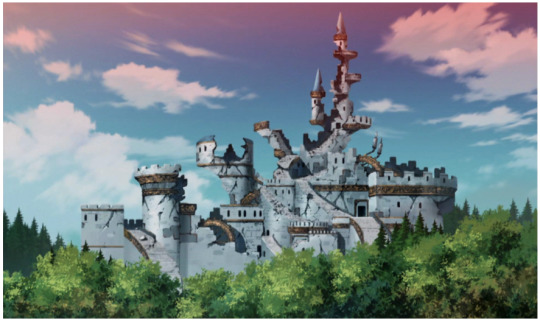
Vector is a spectacle. But he’s is a bit of an awkward character, at least for an Emperor. Unlike the rest of the Barian Emperors, who are morally gray at worst, Vector is pure evil for the sake of it. And generally, villains who are evil for no reason are considered weaker among the cast of villains. Yet he shines through in how yikes he is, and he does have one valid(ish) reason for his appalling behavior.
Vector’s story is one of the most fun out of the Emperors due to how unhinged he is. He is the only Emperor with a near-complete tale. But his story also mixes deeply into Nasch and Merag’s Legend, which creates some problems in how to organize this thing.
To begin, let’s go to his ruins.
Vector’s ruins are located in a dilapidated castle on his island.

Personally, I have nothing to say about this location since this post already did an in-depth analysis on it.

The advanced machinery and layout is interesting. It reminds of the Winchester Mystery House, but that's about it.
Vector’s story is divided into two categories. First is the story of the Legend of the Cursed Palace. This consists of only the text provided within the palace. The second is all the additional information we obtain through Vector’s memories, Nasch’s memories, and Abyss’ intervention. Because of this, Vector’s past is the most vast out of all the Emperors. But is is also the most confusing due to conflicting information.
The Legend of the Cursed Royal Palace is told to us by Rio, and it is rather simple.
Long ago, there lived a cruel prince in a palace. The prince was so cruel that everyone died. The end. Vector was a childish king who lacked faith in humanity. He executed anyone he doubted by beheading them as he watched. According to the legend, when he was “the last one standing” he took his own life by stabbing himself with his sword.
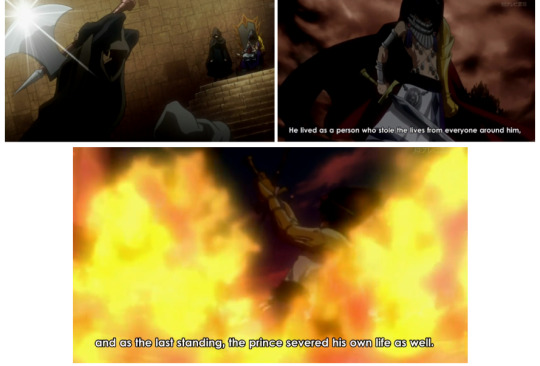
That’s all the information from the ruins. This legend gets complicated with the rest of the story, so I’m gonna recount it as briefly as possible without any additional analysis.
Starting all the way at the beginning, Vector was born as this little uggo peanut right here, and he was the herald of peace.

He came from two persons that are complete opposites of each other. One is a kindly mother who desires peace and the other is a ruthless warlord who wants war.
While sleeping in his crib, the Mythyrian Card “Number 65: Split-Decision Djinn - Judge Buster” fell onto him from the sky. Vector absorbed the Number into his body.

Years later, Vector’s father fell ill. Vector took over the kingdom, and he promised his mother and his citizens that he will bring peace to their kingdom. He did this by signing a peace treaty with the nations his father was warring against.
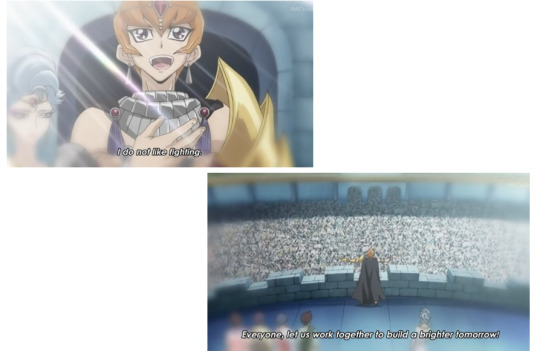
Angered by this, his father pulled out his sword and attempted to kill Vector with it. His mother shielded Vector with her body to protect him, resulting in her death. His father then collapsed from his illness and died on the spot.
Vector mourned for a brief moment before Don Thousand approached him. Don Thousand embedded the Over-Hundred Monster “Number 104: Masquerade Magician - Shining” in him to make him believe he killed his parents, thus saying the lovely line “You shall not be the prince of tragedy, but a prince of madness” and Vector followed suit, becoming cruel and sadistic.
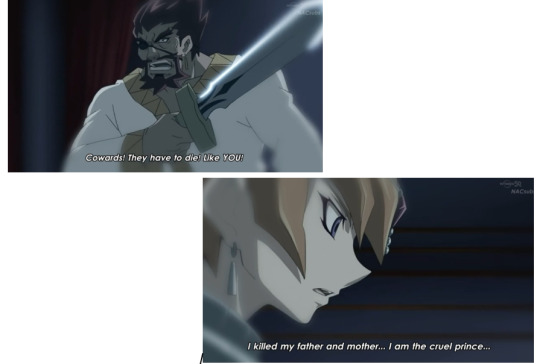
An unspecified amount of time passed before Vector ran into Nasch, Merag, and Durbe.
Vector attacked Nasch’s kingdom with his fleet of ships and “Gorgonic Guardians”, which are Medusa-like monsters. Nasch counterattacks by using mirrors on them. As he was close to losing the battle, Vector performed a blood sacrifice to summon a god, which also happened to be Nasch’s Mythyrian Number “Number 73: Abyss Splash, the Roaring Waterfall Deity”. In order to purify Abyss, Merag sacrificed herself to summon another god, which is her Mythyrian Number “Number 94: Crystal Zero, the Princess of Polar Ice”.

Nasch gained control of both gods and used them to force Vector to retreat. Vector ran as Nasch and Durbe pursued him, destroying villages and kingdoms as he did so.
Eventually, Vector was cornered in a Labyrinth, where he tricked Nasch into sending his army to their death via a Shadow Game. Regardless, Nasch defeated Vector again.

Vector fled back to his kingdom this time. In a fit of rage, he murdered everyone in his kingdom. Nasch followed him to the palace and found Vector surrounded by the dead bodies of his people.
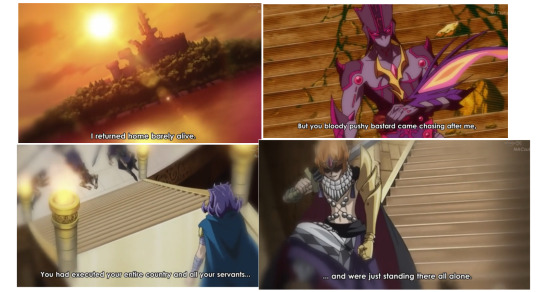
They had a final showdown; Vector lost once more. Upon losing and in Nasch’s words, “... those you murdered... dragged you into Hell”.
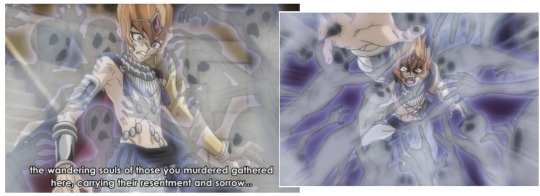
And that’s Vector’s story.
Now, the only thing that is up for debate is how Vector died. The Legend of the Cursed Royal Palace stated that he committed suicide while Nasch’s recount said that the souls of his victims killed him. This may be a plot hole, but in the prior episode, both sides of this story were mentioned. Vector had a nightmare where he was being chased by the restless souls and Astral mentioned that the mad prince took his own life. Vector originally denies Nasch’s recount of his death at first, but quickly the souls manifest (because they were dueling on the field where Vector held his executions) to prove that this scenario did happen. This means that the writers are semi-aware of the situation, but they don’t state which is the true fate.
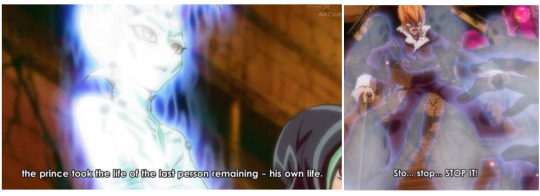
Since it is unknown who scribed the legend onto the ruins, Nasch and Vector’s shared memories + the final scene in the Vector vs. Nasch Duel outweighs what is written in the palace.
If anything, it’s possible that the tormented souls drove Vector to the tipping point of his madness, resulting in Vector taking his own life to escape them. Although, that is just my interpretation.
But from here, we can finally discuss Vector because he is just full of it.
Firstly, I want to talk about genetics. Specifically these lines right here.

I find this extremely fun because there are two things at play here. First is that Zexal specifically states that his cruelty derives from his father—on the other hand, his kindness should derive from his mother—and second is that Don Thousand is able to kick this into overdrive. I doubt that the writers were thinking about any of this when they made this story, but this is a fun observation that I noticed (but if they were, kudos to them).
Forcing some real-life concepts onto yugioh again, let’s talk about heritability. Heritability measures the variation between a trait of a parent (such as hair length, body size, temperament, ect.) and the traits of an offspring within a population of individuals. High heritability means that the phenotypes (physical characteristics) of the parents correlates to the phenotypes of the offspring, and vice-versa with low heritability. In humans, personality is a heritable trait, and in our species, one of the most heritable personalities is neuroticism. High neuroticism attributes to emotional instability and plays into emotions such as jealousy, loneliness, anxiety, anger, ect.

There are four other major personalities, but for this, I’ll focus on neuroticism. Honestly, you could put any trait here since any of them loosely applies to this concept.
Okay. So does this mean that Vector was doomed to a life like his father. His genetics oughta leaned him that way. But NO, no because humans are far more complicated than that, and genetics is not the only thing that affects a person's behavior. But it does influence it some, and this is the basis of it’s influence.
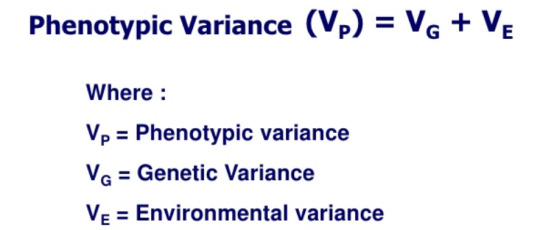
What this says is that within a population, (genetics + environmental influence) = variation of a trait. Some phenotypes are heavily controlled by genetics while others are not. A simple example is if you have tall parents produce an offspring who have the genes for being tall (assume that it is moderately controlled by the environment). If the offspring grew up in a poor environment (less food or something) it will be short relative to the rest of the “tall” population. But if the offspring grew up in a good environment (more food), then it will be tall relative to the rest of the population.
For the five different personalities in humans, each of them varies in how much it is influenced by genetics and how much of it is influenced by the environment (this is stingy since studying the effects of environmental influences on humans is very difficult and hard to replicate). But neuroticism is one that may have significant interactions between genetics and the environment.
But enough science, let’s go back to Vector. Vector is really fun because his situation allows him to exist on all of the spectrums. He went from incredibly kind-hearted and peaceful to just not. This is possibly due to his inherited neuroticism and the environment he was exposed to.
It is likely that the “current” Vector’s neuroticism is rather high. Scoring high in neuroticism means that an individual tends to have low emotional stability, which attributes to frequent mood swings, high irritability, insecurity, and emotional volatility. This trait is more complex than that, but that’s the general gist of it. Most of this could be seen when it comes to how he treats others and how others treat him.
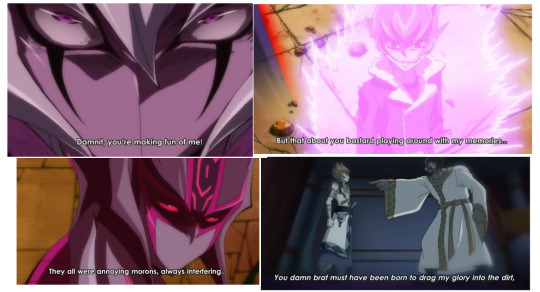
With Vector, he hates it when other people mock him or control him. This is why he despises Nasch for being better than him and why he betrays Don Thousand for toying with him. He is someone who needs to be in full control of the situation; this could be because of his insecurity (like, he got really pissed when Merag gained the upper hand and began to insult him during their duel). Vector is also described as being incredibly untrusting of other individuals, hence why he kills anyone he doubts. These traits are similar to that of his volatile father, whom he also shares a similar vocabulary with when describing people they hate, or anyone against war.

On the other hand, scoring low in neuroticism means that an individual can handle stress very well. Often, they are calm and composed. This could only be seen in Vector prior to Don Thousand’s interference; i.e. when he was handling the kingdom after his father got ill. He also maintained his calm composure while his father scolded him and pulled a sword to kill him.
His mother was kind and his father was not; Vector likely inherited some mix of neuroticism from them. Kindness and evilness was always inside Vector. And this allows him to exist as the kind “Rei Shingetsu” and the cruel “Vector” depending on the environment he was exposed to.
So what were the different environments? I think it was the Mythyrian and Over-Hundred Numbers.
Genetics played a role in shaping the core of Vector (“the same cruel blood as the king is running through you” and all) but it was the environmental influences added onto his core. Here’s a simple graphic.
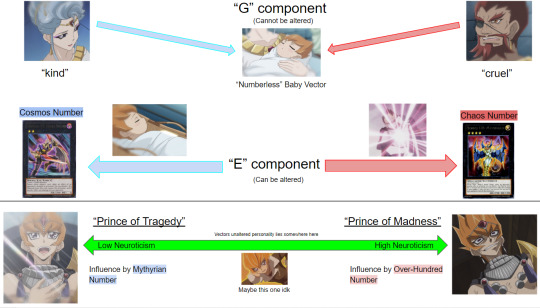
Vector is a baby who inherited his father and mother’s neuroticism (perhaps he has an intermediate; I do not know the mode of inheritance of this). The Mythyrian Number card pushed him hard into the low neuroticism section. The Over-Hundred Number pushed him into the high neuroticism section, and this was where he stayed until his death by Don Thousand.
What I’m getting is that the “gentle prince” persona is not the actual Vector, but a Vector under the influence of a Number Monster (albeit a kind one). You could say the same with the “Prince of Madness” Vector, that he is also a false Vector influenced by an evil Number Monster, but there’s some glaring evidence that this evil Vector is closer to the actual Vector than the kind one. I’ll get to this later when I talk about his Guardian.
It’s highly possible that a “Vector” untouched by the Numbers would have existed somewhere in the middle since his mother and father would be the environmental influences in that case (or maybe they would’ve pushed him to one side too). The closest we get may be the one at the very end of the show, where Vector is “not evil” but still a trickster, mischievous type of guy.
Overall, Vector is a character who had great potential for kindness, as stated by Don Thousand, but he also had the greatest potential for darkness as well. Don Thousand took advantage of this and gave Vector the environmental influence he needed to become the cruel, lovable character we know today.

I just think it’s neat that Vector has a plausible reason why he went from baby to killer.
Alrighty. So about those dang Number cards.
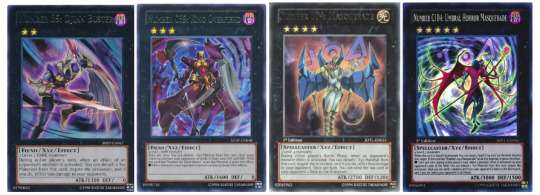
Both of these cards and their respective Chaos upgrades represent the two sides of Vector. “Number 65: Split-Decision Djinn - Judge Buster” to “Chaos Number 65: Split-Decision Demon King - Judge Devil” and “Number 104: Masquerade Magician - Shining” to “Chaos Number 104: Masquerade Magician - Umbral”. There is one specific play with these two that makes me enjoy Vector so much.
But before I get to that, I need to talk about the influence of each monster on Vector and his Guardian.
As stated previously, these monsters altered Vector’s personality. “Masquerade Magician” is the more obvious of the monsters. It’s a masquerade; it hides under a mask and fools people. That’s just a normal Vector. A neat factoid is that the “Shining” to “Umbral” at the end of “Masquerade Magician” is related to the reveal of Shingetsu to Vector. Shining obviously means light (hence the light-attribute) while umbral means shadow (hence the dark-attribute). Number 104 and its Number c104 were first played when Vector revealed himself to Yuma during the Sargasso Arc. Light to Shadow, Shingetsu to Vector.
“Judge Buster” is more difficult due to its relationship as a Mythyrian Number. It is a monster who altered Vector to be as good as he can be. It is supposed to be a fair and truthful judge, the polar opposite of “Masquerade Magician”.
But this is where things get very complicated. Despite being Vector’s “good” card, it is no different than the Over-Hundred that infected him. From the perspective of his father:

Vector is a “cursed” child because he lacked any of the ruthless characteristics of his father. The way the Numbers “65” flashed on the screen is also similar to when other characters use or get possessed by a Number Monster. Vector was cursed, or possessed, to be a kind and gentle prince. In this case, despite being a very positive force on Vector’s life, the curse of a Number is still a curse. Eventually Vector loses his initial curse to inherit Don Thousand’s curse.
But the story of “Judge Buster” doesn’t end there. It continues into the story of Vector’s Guardian and it’s ascent into a Chaos Monster.
The Guardian of the Cursed Royal Palace is a very interesting one. Vector is unique because his Guardian is completely unrelated to his Mythyrian Number, unlike Jinlon and Abyss for example. Vector’s Guardian does not speak and can only be described as a feral, bloodthirsty beast.
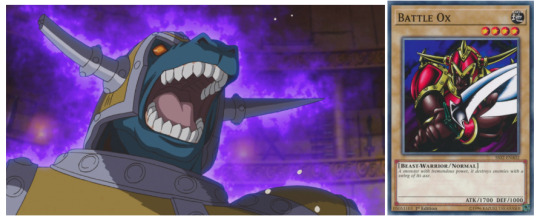
This guy is based off of another card called “Minotaurus” or (“Battle Ox” in the TCG). Despite not being related to the Mythyrian Number like the other Guardians, Minotaurus is completely related to Vector’s story. It’s flavor states “A cattle monster with tremendous power. It mows down anything with a single axe swing.”
Now, there are several things to note here. An obvious one is that the Guardian is a Minotaur. In real life, the Minotaur derives from Greek Mythology. It is a beast that commonly resides in Labyrinths waiting for sacrificial maidens. With this detail, there is a direct connection to Vector’s story in two ways.

First is that Vector describes his palace as a “Labyrinth of Screams” and second is that he lured Nasch into a Labyrinth to kill him. Two very prominent settings in the Vector’s story.
Minotaurus is a deliberate choice made by the writers to tie this theme together, but this is just a neat easter egg. It is the actions of Minotaurus is what counts.
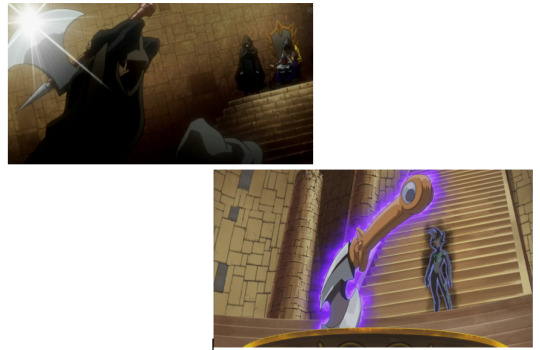
The other thing is that Minotaurus’ weapon of choice, its axe, is located on the execution slab where Vector beheads his enemies.

Finally, and the one that I think is the most interesting and peculiar, is that the axe has Vector’s Mythyrian Number embedded in it.
This is highly significant because if we look at all the other low-grade Emperors, their Mythyrian Numbers were abandoned when Don Thousand infected them (and they died shortly afterwards while Vector lived a part of his life with his Over-Hundred inside of him). In the end, most of the Mythyrian Numbers we see are held on a pedestal, or given some type of reverence in the afterlife.
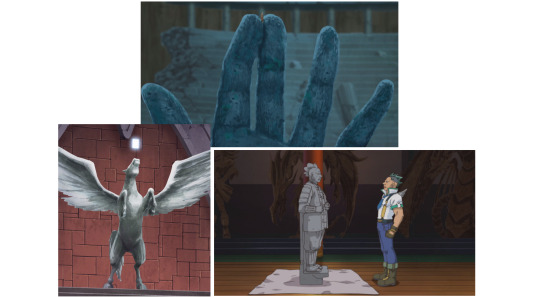
Vector’s card has an axe going through it, like he was trying to get rid of it.
There’s a lot of assumptions to be made here with the most basic argument being that this detail bears no significance to Vector. BUT my theory is that the spirit of the card manifested to him at some point after he became a ruthless warrior. “Judge Buster” may have been trying to help him, or it was trying to convince him that the Over-Hundred infected his mind. Since Vector is a character filled with doubt and trust-issues, he likely ordered his executioner (Minotaurus or someone else) to behead “Judge Buster”.
(Also, Vector said he noticed that Don Thousand altered his memories “a long time ago”? It was never stated how Vector found out. I think that he may have gotten this critical information when “Judge Buster” manifested in his past life. Perhaps it told him everything that happened. This means that Vector known the truth about his fate since his past life, and given his slick shrewdness and foresight, perhaps)
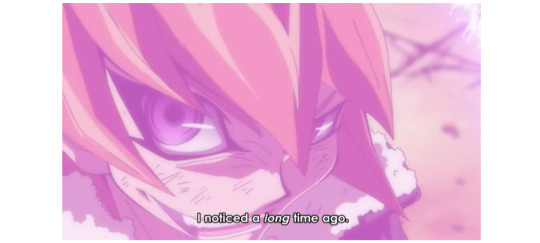
So you know when I said that “evil” Vector is probably closer to the “true” Vector than the kind one? It’s due to his relationship with his Mythyrian Number. From this possible encounter in their past life, the end result is that Vector actively rejected the Mythyrian Number’s blessing to accept his cruel heritage, which is thoroughly reinforced in this scene.

In his duel against Nasch, Vector used “XYZ Discharge” to give Nasch all of his monsters to feint surrender after he found out about his true past. Vector immediately turned around and used “Trick Buster” to blow them up and kill Nasch while his guard was down. This move tells us everything we need to know about Vector. Vector knows of his two lives as a “good” and “terrible” person, and he chose to actively ignore them. The card “Trick Buster” could be seen as a combination of his two curses and what Vector got out of it. “Trick” comes from the trickster nature of “Masquerade Magician” and “Buster” comes from “Judge Buster”. Like with his past encounter with “Judge Buster” (which should’ve been able to repel the curse of the Over-Hundred) Vector rejected and executed his Mythyrian Number as he did with this new, possible redemption.
He made that choice. He made both of these choices on his own free will. This is a major reason why Vector is described as “evil for evil’s sake”. When given a chance at redemption after he “found out” about his true past, instead of rejecting the life that Don Thousand gave him, Vector staight up said he doesnt give a fuck if he was supposed to be a good person. It’s kind of incredible and I think that’s just,,, wow i love him.
And to add onto this fact, we need to talk about the Mythyrian Chaos Numbers, which is an oxymoron in the Zexal universe. “Judge Buster” and “Abyss Splash” (Vector and Nasch’s Mythyrians respectively) are the only Mythyrians who become Chaos monsters as well as being the only Emperors who use their own Mythyrian Numbers (Gilag doesn’t count due to raccoon-related shenanigans). This holds some discussion between these two, but I can’t really talk about it until I talk about Nasch.
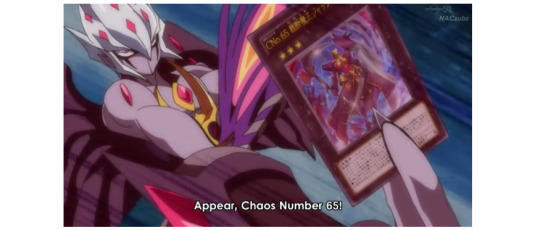
However, what I want to say is that Vector chooses to use his Mythyrian Number. Although he randomly summoned it with a card effect, Vector plays his Mythyrian Number. Likewise in my discussion with Alito’s ruins, the Mythyrian Numbers have a purifying effect on the Emperors. It reveals their true, unaltered personalities. By choosing to use a Mythyrian and subsequently revealing his true nature, the cruel person we see is just how Vector is. His usage of “Trick Buster” backs this up. I don’t think it's a coincidence that Vector and Nasch, arguably the strongest of the Emperors, are also the ones who accept their Mythyrian Numbers yet still end up in Barian World. They are also the only ones that were able to Chaosify their Mythyrians, with Nasch performing a proper Chaos summon while Vector pulled into “Chaos Number 65: Split-Decision Demon King - Judge Devil” by luck.
Because of his denial of the Mythyrian Number despite being aware of its existence, Vector is the only Emperor that isn’t described as heroic in his legend. By being an active participant in his descent into Barian World, Vector cannot have a heroic legend like the others. He is simply a vile person who likely deserved his spot in Barian World.
Now that we got that down, why did Vector end up in Barian World despite being his “true personality”? A simple answer is that Barian World represents Hell, and Vector deserved to go there. However, it’s repeatedly stated in the show that Chaotic persons end up in Barian World, not bad persons.
And Chaos is complex due to the range of characters it goes through.

Like, this is a massive list of personalities, and they are all canon Chaos creatures.
And if you haven't noticed, I haven’t discussed the Cursed Royal Palace’s duel yet. This is because it occurred between Black Mist and Astral, and it has little relevance to Vector himself. However, that battle ties into the complexities of Chaos that I will continue with Nasch and Merag’s Legend, as well as the rest of Vector’s story.
Bye.
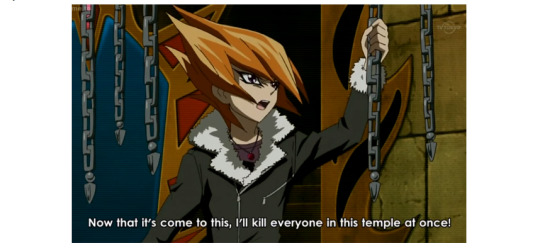
#long post#tw long post#zexal#vector#barian biology#dyzarc diet#dyzarc writes#sory for the length#blog shouldve stayed deleted#this one went on a weird tangent
68 notes
·
View notes
Text
The Dark Dinasty
The planeswalker could feel his mana and his powers fading as the servant sucked the jugular's blood. The creature swallowed the fluid of his mortal body in large swallows, in spasms of an irrational, blind, wildly objective hunger. As he tried in vain to focus on his distant mana bonds and recall the most banal of magic to get rid of the bloodsucker, he cursed his own nostalgic nature. Why should he have maintained this worldly, fragile and vulnerable form? He was a god. His power was unlimited. His knowledge was vast. He could have manifested whatever physical body he wanted. But why, damn it, did he remain so fond of this miserably weak, pathetic form from his distant times as a mortal?
His opponent began to approach, walking through the swampy terrain in slow but steady steps, not loosing the magic that kept him submissive even a bit. No more wearing his chained mask, his expression was a mixture of controlled anger and contentment, his eyes glowing with mana beneath his scabbed face. His obsidian armor, though dirty by the rotting loam of the mire and by the blood of several of the creatures conjured during the duel, also emitted a flickering, pale and morbid glow. Possibly the reflection of the last rays of the sun hidding behind the nearby hill and the castle at its summit, spreading the shadow of its bulwark. Or it could be just a glimpse of the last tibbits of mana leaking from his dying body. His senses faded. It made no difference anymore.
Striking with the hilt of his sword, the geared planeswalker took his servant away from its victim, making it pull large strips of skin and flesh in its fangs. He crouched over the dying, motionless body of his subjugate, putting one knee on his chest, and one hand on his bloody throat. This can only mean one thing, he said in a low but perfectly clear and audible voice. The inevitable happened. I won.
In a slow, steady move, he tipped the blade into the defeated opponent's stomach and pushed it in, then up, causing him to spit out living blood until the blade came out through his mouth. The lifeforce of the beaten man began to pour forth from his spark like a newfound fountain, and the victor came to drink it, delighting in power, and rejoicing in victory. Power. If there's a most valuable prize in the entire Multiverse, it's omnipotence. Be in control of everything. Being above all else. And anywhere, anytime, blood is the universal currency that pays for it.
Are you done? The female voice, full of austerity, sounded astonishingly imposing for an inquiry. The planeswalker in black armor turned in its direction. The long, golden hair of his inquisitor gleamed lightly in the last rays of daylight. Her expression was stern, harsh, disapproving. She was solemn and beautiful. Like an angel. He rose in readiness. But what?... He thought of the quickest spell, the fastest attack he could use. Damn it. How did he not notice her approach? How was it possible, to be caught off guard this way? No, it was not, that was impossible. It could not happen to him.
The blinding flash came before he could finish his thoughts. And then, silence.
***
From the ride on the bulwark, the Baron stared at the horizon. Motionless for hours, immersed in his thoughts. Time and again he looked away to see some movement, some passants, some light fading and some new flashing in the barony that surrounded the castle. The familiar sounds and smells the cold wind brought to his senses produced a strange mixture of feelings: a pleasant satisfaction and confidence, and an uncomfortable irritation. His domain was admirably broad, and unquestionably strong. But it was also eerily incomplete. Unforgiven.
For a couple months he did not send reinforcements to the patrols on the edge of Aysen. The last troops sent through the portal had been particularly numerous, and still none of its scouts, warriors, and shamans had yet returned. It was necessary to recompose the numbers before deepening any military initiative. But it was also necessary to do so with tranquility and parsimony. Resources were not exactly abundant at this time. Peasants and villagers have been through a low birth rate over the past decade, and the paladin order has been relatively successful in segregating and concealing potential new acquisitions.
Numbers. Mortals multiply like pests in a cereal warehouse, abundant and hidden inside crevices, far from the eye of the farmer. It is a strength of theirs, no doubt about this. A primitive and pathetic force for sure, but it can not, and should never be despised. We can not afford that. So many prey are needed to feed the predator. And she knows that too, that hypocritical lover of mortals. She always knew. As she also knows exactly how to exploit this strenght to achieve her goals. An old and uncomfortable inconvenience. The strength of one lies in the weakness of the other. Of course, two can always play the same game, but favorably breaking the delicate balance of forces required will, resources, and patience. The Willow had the ephemeral numbers at her side. The Baron had the time.
Sharel! The name echoed through the nearest tower window. Even after all these years, he never understood its meaning, or its history, or why she called him that way. But that was never important for him. The interesting part was that she always called him during her delusions and her crises of hysteria, and these were usually quite productive times, as well as lots of fun at almost every occasion.
Hello Grandma. The sarcasm in his voice, repeated over the centuries, sounded natural, even affectionate. Here I am. What do you want to talk about today? She responded with a guttural and rough sound, but she did not seem to have heard the salutation anyway, so that sound could mean anything. Her fragile, squat, wormy figure reflected well the senile and deteriorated state of her mind. But it did not even indicate the brilliance hidden under layers and layers of dementia, accumulated over countless generations. Her name was Ravi. It was written in each of the tomes, on each scroll and manuscript carefully stored on the tower's shelves for hundreds of years.
Ravi approached one of the dusty shelves, pulled out a particularly long parchment, and handed it to the Baron. Tanned, faded leather no longer indicated its raw material, but the strand of human hair that held it tied gave a clue to it. She had worked on it recently. The ink still emanated an ocher, ferrous odor, and it was still vivid and intense, with ruby shades still clearly distinguishable. Her handwriting was frighteningly precise. Each rune meticulously aligned, each drawing and each diagram traced with the accuracy and delicacy of an artist. This parchment was not like most of the others. It did not contain the words for ancestral spells, or rituals for powerful curses. The Baron had a particular appreciation for works like this one. Less privileged minds who could interpret the witch's foreign writing would only see meaningless drawings and disjointed words there, the works of some maddened visions of an old madwoman. Yet, the Baron saw there the patterns of memories. Much more than the ordinary memories of an ordinary life. Those words told a story. An extraordinary story, of expeditions to distant worlds, of wars and of conquests. Lessons of knowledge, and precious opportunities to achieve power.
The Baron himself possessed the knowledge which the majority lacked. He himself had been brought into this world, coming from another distant place. He remembered his homeland, where his sovereign line dominated. He remembered with satisfaction the pleasures of being part of a dominant and undisputed elite, enjoying among equals the powers over life and death. He was resent at being removed from his position without his consent, at being unwillingly used as a servant, manipulated and treated like a mortal. But he also saw in it not only reality, but opportunity, one which until then had been unknown to him. His previous life did not live up to his abilities. There were much bigger domains and trophies to be won. His lineage could reign absolute, not only on one, but on all worlds. And he would no longer be brood, but the progenitor of the greatest dynasty who had ever existed and would ever exist. The opportunity to make the Sengir Dynasty omnipresent and omnipotent was within his grasp. It was up to him to take it.
Sengir approached the old sorceress, took her rugged, cracked face in his hands, and stared into her gray and disheveled eyes, half-covered by folds of flaccid, parched skin. He saw in them more than the memories and madness of many centuries. He saw his own reflection, and far beyond it. Most of all, he saw a promise. And he would stick to it. He then kissed her lips, her cheeks, and her forehead. Thank you, Grandma. It's always a pleasure to have these conversations with you. I'm going to leave you with your privacy now, I just remembered I have a very important meeting. I'm going to meet an old friend and can't let her waiting.
As he left the room, he glanced at the old woman, and he had the impression of a smile on her face. But that was not important. Coming from Ravi's dementia, a smile could mean anything.
***
The dwarves in this world were identical to those they knew from the homelands. They were smart, but very stubborn. They were impetuous and organized, determined, and ironically proud for a race of mortals. Even their physical appearance, their clothes, their mannerisms were quite similar to those. It seemed safe to assert their kinship, even though they were only found here around the portal. Their blood tasted equally strong and displeasuring, and they presented an inconvenient resistance to sangromancy. They weren't anything collaborative, either. They presented the same natural tendency to quarrel among themselves and to rebel against their masters. Generally, they needed to be properly nullified before being put into use. Under normal conditions, they would be far from good servants, much less food.
But those were not normal conditions. The troops were in an inhospitable land, in an arid and sparsely populated region. Their resources were very scarce. Mesas chastised by an inclement sun did not provide adequate shelter for a breed of nocturnal predators of pale skin and delicate, highly specialized senses. The dwarf refuges they could locate in the area did not offer the best in accommodations either, but due to their precarious situation, they had been serving just fine as makeshift shelters.
Zanon had recently been promoted to lieutenant, receiving a personal appointment from Captain Veldrane. She fell in the Baron's favor on her second foray into the frontier, when her detachment of patrolmen managed to intercept a caravan of rebels escorted by a troop of paladins who practically equaled them in number, killing half of them, and redeploying almost thirty mortal fugitives to the Barony. She then began to command a contingent three times greater. Appointed to lead the research expedition into the dwarf portal, she received guidance and training from the Baron himself. She attended his mission with much interest, unlike most of his commandeers. The warriors took the mission for a delirium, a suicidal act motivated by caprice and madness. Still, they would not dare oppose their master's will. It was still preferable to risk an uncertain adventure, to face the exemplary punishment of the Sovereign of the Night.
What is it that you bring us this afternoon, Malakir? Some are even uglier than these dwarves, and almost as ugly as you. Bring them where I can look at them closely.
We saw others of these natives during the raid, sir. These white skinned people call themselves 'kor'. The deformed and stinking dwarves are called goblins. There are also hotbloods among them, though the ones here are very different from the Barony's hotbloods. We caught this group here on our return, snooping around the camp. And coming closer to the liutenant, he whispered: and whether you're my immediate superior or not, Zanon, I'm going to tear your tongue out through your nose the next time you call me ugly, you damn barrack rat. Zanon smiled at her friend.
The group of new captives was really unusual. A kor woman and a man, both defiant-looking, and a third that were quite strong, but nullified for causing a little more trouble than the others. Also three frightened goblins with apprehensive expressions in their faces. They seemed to be two females and a male, but that was a little difficult to assure. The commander bellowed at a group examining one of the strange carved monoliths of the place. Hey! Anowon! Come here! The shaman approached the leader lightly, solicitously. He spoke little, and maintained the solemn posture typical of the bloodwizards. Take a look at these strange new friends we just made here, Anowon. I barely understood what the stonediggers were saying, but with these new comrades here, I do not even know where to start. I need an interpreter. The shaman frowned as he looked at the goblins, but relaxed as the commander nodded to indicate the kor couple knelt behind them.
The bloodwizard pointed his finger at the kor woman, and two warriors lifted her by tied arms, prostrating her before him. The prisoner's gaze remained defiant, but she shifted it to the floor and lowered her head, as if realizing what was to follow. Put her on her feet. Even standing, she did not look at him. Anowon caught her by the stuck hair, and pulled her head back. He began to examine the shapes of her jaw, her neck, her jugular. He exposed his white fangs.
The kor man leapt over the three goblins toward the nearest warrior, plucking the blade from his waist and nailing it to the neck of the other warrior at his side. He did not know who his captors were, but they obviously believed that ropes would keep a kor prisoner. The kor woman took advantage of the distraction and also released as she grabbed the dagger from one of the takers and kicked the wizard away, then escaping through the pair of surprised warriors.
But the mutuous ignorance continued providing surprises, as the kor also did not imagine their captors would be as agile and swift as themselves. Aysha, no! The male kor screamed at the sight of the invading boss's blade coming out of his mate's chest. As the blade slided back, she dropped to her knees again, this time her challenging gaze giving place to a fearful expression and a silent help request. The chief pulled her head back again, and the reddened blade slid across the white skin of her neck. An instant and a kick that broke his leg later, the other kor was also on his knees, with two warriors holding him brutally and a third pressing the tip of a blade to his heart, realeasing a trickle of red. Zanon approached the kor, calling Anowon closer again. The cattle here bite even harder than ours. She punched the kor's nose, draining even more of the precious liquid. Do your job, wizard.
The visions provided by the mortal's blood were impressively vivid and clear, as if the shaman himself had always been present within the memories. Anowon had read the memories of other explorers before, but never in his lifetime had he ever known such remotely rich experiences. Zendikar is how the natives call this world. It is a pulsating and wild world, very different from our exhausted homeland. The magic here flows from every chink of rock, and emanates from every piece of ground. I felt it when we arrived, and now I see. My sangromancy has never been so potent as it is now. There is even more power emanating from these monoliths, they are worshiped by the inhabitants here. They seem to have some kind of connection with their gods. And this place, Guul Draz. It resembles our places of power, and is far more suitable to us than this sunny aridity. There are also several agglomerations of hotbloods in the surroundings, including more different types of them. 'Elves'. We need to find the place, Commander. That's where we'll have our best chances here.
Great, and that's what we'll do without loss of time. Zanon looked at the goblins, who watched as quiet as if they expected the conquerors to forget them. Malakir, I want your detachment ready to leave in a few hours. You'll choose four or five experienced bloodwizards to accompany you. Set aside the minimum necessary supplies for the first few days of an expedition, you'll have to turn out with whatever you find on your way during the next few months. You will take these little friends of us for a ride. I want you to find this place, this Guul Draz.
Yes sir. Should my messengers meet you later in this same place?
They should, my friend. I do not intend to venture all our troops unnecessarily into this unknown world until we can be well installed and strong. In addition, we are making history here. We are building something that will last for a long time, and this calls for a monument to match. We have here these power rocks, and the stonediggers are good with this kind of work. Turning toward the now almost dark horizon, Zanon smiled, remembering the Baron's dream and teachings. His Dynasty would rule all the worlds until the end of history, and she was he the one who was taking the first step around it.
Go now, Malakir. The time is right. As for me, I have a temple and an empire to start building.
#fanfic#historical fiction#magic the gathering#mtg#sengir#dinasty#ob nixilis#the chain veil#serra#autumn willow#ravi#veldrane#anowon#malakir#ulgrotha#barony#zendikar#the lithomancer
3 notes
·
View notes
Text
Criticism. As writers, sooner or later we’re likely to encounter it. How we deal with it – either internally or externally – depends greatly on our personality, and also I suppose, on what sort of place we’re in at any particular moment.
Here are some of my thoughts on the subject.
So someone posted a nasty remark on one of your social media book shares, or left a shitty 1 star review and a harshly-worded comment for you on Amazon. You stare at it, re-read it a second time just to try and absorb any sense or usefulness in the words as you fight a rising tide of red anger surging up from your chest area.
Why did they do that? Was the book really all that bad? Was there really something wrong with your writing? How could they be so mean – don’t they realize I pored my heart and soul into this? Is what they said in any way helpful or – no matter how remote – possibly true?
There is a huge difference between someone being helpful (or trying to be) to a writer. “Perhaps you should’ve made the story longer? It was great – just too short!” or “You misspelled ‘bureaucracy’ on page 11!” are examples of positive criticism. My mom always used to praise my writing talent, but frequently criticized my choice in genre – she didn’t enjoy sci-fi – she suggested I write in more contemporary, mundane settings… in genres like suspense, drama, action and adventure! I used to counter with “but I can do that in sci-fi too!”
That sort of criticism is helpful, positive and constructive in nature – and they can be discerned on the basis of their intentions to help the writer to grow or improve their writing, not to break them down for it, or even to cause them to stop writing altogether.
There are numerous and even perhaps unfathomable reasons for people to criticize a writer or their writing in writing – by leaving nasty remarks, bad reviews and even by sending them hate-mail – and on the unhelpful side, they include everything from simple jealousy to disagreement with the writer or their statements, and even disapproval of their subject and the way they address or present it often form part of the motivation for it.
In the following example, a reader downloaded a FREE eBook of mine – a short story called “Death By Vampire”. They left a poor review and a rant on Barnes & Noble.
“This book was only 19 pgs. Had potential. ***spoiler seemed to have a lot of unnecessary information. Also the description of the blood diamonds didn’t make any sense, they are named for their color but the color is green? Needs some editing.” 2 stars – Anonymous
I know this person didn’t actually READ the story, because inside it there was a whole paragraph that EXPLAINED how the aliens called the green stones ‘blood diamonds’ because they had GREEN blood – but it “needs some editing” because he didn’t understand it? All this guy did was expose his illiteracy!
As to length, it was a free short story, but he obviously missed that part too. Yet that story now has a 2-star review and a snotty comment from someone who obviously has problems with comprehension – and a narcissistic mean streak.
What can I take home from this? Not much – just that some people are basically mean-spirited and will make me the scapegoat for their own failures… but then, being part of an oft-persecuted social grouping blamed for everything from stock-market crashes to natural disasters, that’s nothing new to me. Should I take it personally? I’d like to think not – after all, what real value does unfair criticism really have?
In a technical sense, is there anything I can change or improve on the item involved? Were the words or sentences not clear enough? Were they confusing? Was a thorough spelling and grammar check done during the editing process? I honestly can’t see how I can make the story – or the facts of the story – any clearer without resorting to formatting the eBook using neon lettering, or replacing them with pictures to cater for the illiterate ‘reader’.
Moving on, negative reviews left at book sellers can and do damage a writer’s reputation – and in the long-run, their income. Reviews and ratings affect sales and distribution after all, mainly because readers will be more inclined to look at a book that has a bunch of 4 and 5 star ratings rather than a book that has one or many 1 or 2 stars. Let’s look at an example:
A few years ago I witnessed a writer falling under attack from his former small press, their writers – and everyone else they could rally to their cause. Lies and slander were spread broadly, and I personally witnessed calls being made for their cohort of cronies to ostracize him from the writing community and to even leave negative 1-star reviews on all his books! Other tactics and dirty tricks were employed against this poor undeserving writer, but this one is pertinent to my example. Suffice to say, that writer suffered a breakdown, has disappeared from social media – and hasn’t publishing anything since 2016. In that case it’s safe to say the bullies and haters won.
Any hostile criticism of our work as writers tends to have the potential to cause a writer to doubt themselves. Often that can also be one of the reasons why people leave nasty remarks – the writer or their work has (for whatever reason) offended them – and their intention might be to hurt them out of some feeling of vengeance or satisfaction. Some people, like the unfortunate author in my example are less resilient in the face of such attacks – while others, like me – well, I just don’t care for what the nasties say – anyway, I have more than enough fan-mail and great reviews to compensate. As far as I’m concerned, it’s water off a ducks back – and I’m a very oily duck.
Naturally, there are some things that spring to mind for every writer when faced with stinging and even personal criticism: are they right about me? Are they right about my work? After all, your writing might be utter crap laced with spelling and grammatical errors – and the story might make no sense, have plot holes big enough to drive a bus through, and your characterizations might be almost non-existent – right?
Are these critics giving you advice on how to improve your work? Is there anything of value in their ‘feedback’ you can learn from and use to produce a better story?
If the answer is no, and you’ve reason to believe they’re just being vindictive – such as making personal attacks and indulging in name-calling without giving any serious or pertinent pointers on how to improve your work, then their criticism is actually weaponized hatred intended to break you down! Let’s be honest – when someone criticizes your hard work, your ‘baby’, your pride and joy – it hurts a bit! Part of the answer – not the sum total of it – is of course to grow a thick skin.

In my particular case, I write in the science fiction and horror genres – as well as in non-fiction from time to time. While a lot of my fiction writing contains the usual sci-fi or horror elements, some of it also focuses on LGBT issues and presents these in a sympathetic and favorable light – which naturally draws ire and derogatory remarks from the prejudiced and bigoted who seemingly can’t resist leaving snotty comments on social media ads or shares of my work.

It’s not that my work is badly written or poorly presented – it’s that they despise the people I use as heroes and heroines in my stories and dare to explain and promote them in the face of their ignorance and hatred. I defy the established anti-LGBT stereotypes – and I flaunt it. It’s also that, once they do a little background check, they realize that I’m also part of that same group they’ve been programmed to despise! Add to that, once they confront me and I not only stand up to them, but also trounce them in a debate, that really makes them foam at the mouth!
How dare I? How dare I stand in the open, unashamedly writing about people they hate in a good positive way? How dare I not feel any guilt? How dare I even exist?
#gallery-0-10 { margin: auto; } #gallery-0-10 .gallery-item { float: left; margin-top: 10px; text-align: center; width: 33%; } #gallery-0-10 img { border: 2px solid #cfcfcf; } #gallery-0-10 .gallery-caption { margin-left: 0; } /* see gallery_shortcode() in wp-includes/media.php */
In the below example, I held a free e-book giveaway contest in my Facebook author group in August 2016. I gave away a few books to contest winners. Soon after, the South African right wing ‘Christian’ (aka Levitican) community on Facebook went nuts about me promoting ‘demonic writings’, ‘homosexuality, sodomy and demon worship’! It was truly surreal!

The vast majority of the hate-mail I’ve gathered over the years – and remember the ones I’m showing you in this article are just since the advent of Facebook, from about 2016 or so – have been directed at me for sharing my books or writing or website!
Many of these people express negative ideas and emotions towards me because I’m transgender, a lesbian, an atheist – and because I’ve steadfastly refused to remain silent in the face of the overwhelming wave of hatred looming for numerous diverse minority groups in the world today. This provides one reason – albeit a big one – why most of my hostile critics and haters are what they are, or at least explains why they’re hostile toward me and to my writing.
#gallery-0-11 { margin: auto; } #gallery-0-11 .gallery-item { float: left; margin-top: 10px; text-align: center; width: 33%; } #gallery-0-11 img { border: 2px solid #cfcfcf; } #gallery-0-11 .gallery-caption { margin-left: 0; } /* see gallery_shortcode() in wp-includes/media.php */
My advice when receiving this sort of hate-mail or harsh personal criticism is “take it from whom it comes” – which means, consider who the person is that’s criticizing you or your work, and what their real reasons are for doing so – and give it a value or rating. Is their opinion worth your time? Are they trying to be helpful – or are they simply being hurtful? Should you even take what they say seriously? Should you care? Most of the time I laugh at the voluntary idiocy, poor grammar and spelling in the hate-mail sent my way, and casually toss it in the pile.
I have a use for haters and hate-mail you see, and they’re too obtuse to even realize it.
#gallery-0-12 { margin: auto; } #gallery-0-12 .gallery-item { float: left; margin-top: 10px; text-align: center; width: 33%; } #gallery-0-12 img { border: 2px solid #cfcfcf; } #gallery-0-12 .gallery-caption { margin-left: 0; } /* see gallery_shortcode() in wp-includes/media.php */
By far most of my critics and haters are religious extremist fanatics who engage in lunatic fringe politics and vent homophobic, transphobic and often racist language because they see me as more than just an enemy of their personal beliefs – but the personification thereof.
99% of the time, the people sending me hate-mail or criticizing me as a writer are attacking ME directly as an individual, not the worth or quality of my writing. I’ve also had the occasional odd-ball attack me using the fact that I’m self-published as though it means I’m somehow ‘illegitimate’ and not a ‘real author’, when all this does is reveal their ignorance about the publishing industry.

Here’s a clue, peeps – if self-publishing was in any way dishonest or dishonorable, I would have nothing to do with it. If was in any way, shape or form embarrassed or ashamed of self-publishing my work – or under the impression that it was in any way inferior to books by the big dogs, I wouldn’t be openly marketing myself or my writing as self-published!
It’s worth mentioning that within that same group of people who’ve sent me outright hate-mail, I’ve yet to encounter a single one who’s actually READ any of my books – they’re people who simply seized an opportunity to vent their hatred for me as a person because at that moment I represented the thing they hate.
In that light, this means that while my writing is good, even excellent, it is in their view ‘rubbish’ because what I write (or what I write about) contradicts their indoctrinated belief structure. To the folks who almost invariably misapply basic English words like “they’re/their/there” and “your/you’re”, I’m a ‘libral dirtbag’, a ‘libtard’, a ‘Christophobe’, a ‘commie queer’ and an ‘atheist fascist’ – and somehow inferior to them, not just because I’m part of the LGBT social group – but because I’m not afraid, acquiescent, silent or invisible.
I remind myself that these same characters tend to treat anyone more intelligent or in any way qualified, capable or talented than themselves – like scientists, doctors, artists – writers – and a variety of qualified professionals the exact same dismissive way – and I see them for what they are.
Over the last few decades of internet use, I’ve accumulated an archive of hateful remarks of all kinds, from people determined to convince me of the validity and value of their ignorance, to those who resort to childish mockery and blatant name-calling. (You can view it here if you like.)
I’ve always lived by the motto “if you piss off the right people, you’re doing something right”!
One fella wearing the crazy-pants ranted about how my children’s book on bullying, “Other Kids Are Kids Almost Just Like You” – aimed to teach children compassion for others – would ‘turn kids gay’ and that it was child abuse and I ought to be arrested!

So how do I handle hate-mail? Easy. I shrug it off, have a few good laughs – then save it, take screenshots of it – and use it as promotional material! In fact, I actually look forward to getting hate-mail these days!
After all, so many haters can’t be wrong, can they? 😉
I hope you’ve found this useful!
Take care and have a lovely day!
If you would like to know more about Christina Engela and her writing, please feel free to browse her website.
If you’d like to send Christina Engela a question about her life as a writer or transactivist, please send an email to [email protected] or use the Contact form.
Show your appreciation for Christina’s work!

All material copyright © Christina Engela, 2020.
How I Handle Hate-mail & Criticism As A Writer Criticism. As writers, sooner or later we're likely to encounter it. How we deal with it - either internally or externally - depends greatly on our personality, and also I suppose, on what sort of place we're in at any particular moment.
0 notes
Text
A Series of Unfortunate Events (opinion piece)

From Page to Screen to Screen... Again...
Normally, this would be the point in the week where I’d post a movie review, but seeing as nothing very interesting came out this weekend, I decided to try something new. Today, I’ll be looking at both the 2004 movie and recent Netflix TV adaptations of Lemony Snicket’s A Series of Unfortunate Events, and seeing how they each hold up against the books on which they’re based. Sure, there’s about a dozen other articles/video essays that I can think of off the top of my head that deal with the same question of “which is better,” but being that I’m such a big fan of the books, I figured I’d throw my hat into the ring, an expression which here means: “write a big long think piece for my blog that nobody reads because I’m bored at work.”
So anyway, there seemed to be a general sigh of relief when Netflix dropped their long-awaited adaptation of the classic 21st century children’s series, which was seen by many as a sort of apology for the crimes committed by the 2004 Jim Carey version. “UGH,” said the collective millennial public, “FINALLY we get a proper adaptation of these books I haven’t picked up in over a decade!” The whole thing felt eerily similar to the reaction against the Star Wars prequels when The Force Awakens came out almost two years ago (holy shit, it’s been almost two years hasn’t it?) The fact is, no matter which side of either debate you stand on, it’s impossible to deny that we’ve backed ourselves into something of a corner when it comes to judging movies/television on its own merits. Save for the occasional original gem, the vast majority of modern entertainment is comprised of re-workings and re-hashes of material that’s previously existed in some form or another, meaning it’s impossible to analyze said material without at least discussing its fidelity to the original source, and close to impossible to not let that influence how you think about it on its own. No, you CAN’T like Episode I because Jar-Jar isn’t nearly as funny a Chewbacca. No, you CAN’T say Game of Thrones is better than the books because Daario’s hair isn’t blue in the TV series (seriously, this is the shit people argue about now-a-days).
And now, it appears not even A Series of Unfortunate Events is safe, which is really *ahem* unfortunate, considering Dan Handler’s 13-part YA saga might be one of the best things to happen to children’s literature since… ever. No, seriously, go back an pick up one of those books. Dust it off and shower yourself with some of with wittiest, most (literally) devastatingly brilliant writing this side of Oscar Wilde. For those who grew up with the Baudelaire orphans, these books were a watershed. Not only did they accomplish the insurmountable task of actually getting us to read on our own when we were 9-years old, but they taught us all the hard lessons about life, death, and morality that the adults were too scared to mention even amongst themselves.
So yeah, of course we were going to get a movie with a $150 million budget once they were selling in the same leagues as Harry Potter. And yeah, of course we were going to get a Netflix series once streaming gave us the opportunity to do long-form storytelling on a large canvas without spending $150 million. Which one of them is better? Neither, if you ask me, but I’d argue that bashing them in relation to each-other and/or in relation to the books isn’t going to get us anywhere. A “Cinema Sins” video is going to take us nowhere on the journey to analyzing great art, or even appreciating it. And if there’s anything to come out of the zeitgeist in the last couple of decades that could clarify as great art, it’s A Series of Unfortunate Events.
To start, I want to talk about what each of these adaptations do right. I’ll come right off the bat and say that I love both the show and the movie for many different reasons, and that even though the books will always hold the top spot in my mind, they hold that spot for reasons that go beyond some bullshit like whether Klaus wears glasses or not.
The show, for one, covers a lot of ground. I really despise judging an adaptation on how much they cut out of the source material (more on that later), but there’s something to admire about how closely Netflix’s A Series of Unfortunate Events sticks to the books. Four novels in and it seems like everything on the page has ended up on screen and then some. Adapting for long form television has given the showrunners (one of whom is Handler himself) to actually expand on the story, something rarely seen even in our Game of Thrones age. The argument of whether or not the show “gets the books right” is rendered almost completely irrelevant because it IS the books, just with Neil Patrick Harris. We get to witness all the stuff we’ve been picturing in our mind for years, we get to see the Lucky Smells Lumber Mill come to life, we get to experience going to the movies with Uncle Monty. I think a lot of the reason fans responded so well to the show was because it reflected the books so slavishly, giving us exactly what we asked for by giving us everything we asked for, all at once. It reminded me a lot of the PBS Pride and Prejudice in that it was difficult not to be a fan of the book and not be a fan of the show for no other reason than the show treated the book as a Bible.
The film, on the other hand, is two hours long. Not only that, but it spends those two hours going through the first three novels in the series, something that takes close to six hours in Netflix land. Our automatic instinct is to see this as a fault, but when was the last time you actually watched the movie? Rather, when was the last time you read the first three books? They’re fantastic, sure, but they’re also fantastic books. What enjoys and pleases us sitting with a bulk of paper by a crackling fireplace might not bring us the same joy when sitting in a dark, stuffy room with dozens of other people. One of the big faux pas in all these “which one is better” conversations is a misunderstanding of what different mediums can do and what can be achieved in each. The 2004 film might compress the books, but it illustrates them beautifully. The detail isn’t in how well we get to know each member of Olaf’s troupe, it’s in the little, subtle ways in which they express themselves onscreen. Sure we don’t get to spend hours and hours with Uncle Monty like we would watching the show or reading the books, but with Billy Connolly’s exceptional performance, we feel like we’ve spent hours with him.
The fact is, taken on its own merits, the 2004 Series of Unfortunate Events is a great movie. The aesthetic, the visual storytelling, the writing, and the performances are all so universally fantastic that comparing it to the books feels oddly irrelevant. The word “adaptation” implies some level of interpretation. It implies a level of taking what’s on the page and filtering it through our own personal beliefs and opinions. For all the talk about which one of these versions is “better,” little has been said about the different contexts in which they were made. The general attitude towards the concept of “evil,” which is a big theme in the Series books, was vastly different in 2004 than it is (was?) in 2016. In 2004, the United States had just invaded Iraq. We were still reeling from the single most devastating terrorist attack in human history, and our enemies seemed, at least at the time, very concrete. In the film, there’s a lot more of an emphasis on the idea of “fire” as a weapon. The wreckage of the Baudelaire mansion is shot and treated with the sobriety of a lot of post-911 photography. Jim Carey’s Olaf is significantly more insidious than Neil Patrick Harris’. He gets what we wants through fear mongering and cunning, often fooling nice, reasonably intelligent adults through a series of carefully planned and lethal actions. Much like… you know… a terrorist.
In the Netflix series, however, the enemy isn’t so much “evil” as it is stupidity. Olaf in the show is treated like a complete idiot who just so happens to get his way because literally everyone else is too stupid to know what’s going on. One could argue that while Olaf is the source of the conflict, the real antagonist of the show is Mr. Poe, who, despite “seeming” to care about the kids, constantly places them in harmful, potentially life threatening situations because he thinks he knows better. There isn’t a set enemy here. The enemy, if you can call it that, is ourselves, our own blindness to the reality of our present situation. If that sounds familiar, it’s because it’s one of the many excuses we gave for electing a fucking James Bond villain into one of the most powerful positions in the world. Donald Trump is an idiot, sure, but he’s an idiot with access to nukes, and *apparently* that’s somehow our fault.
You see what I’m getting at here? Whether intentionally or not, art is always in some way reflecting the world in which its produced, and that’s especially true of Series. One could argue that, simply by consequence of the time it was born into, the Netflix show is closer in tone and aim to what Handler originally intended, but I’m not sure I’d agree with that. Sure, the show is significantly more ironic than the movie, much like the books. It contains much more references to pop culture, classic literature, and the world in which it was written, much like the books. But unlike the books, everything I just said comes off as funny, surreal, and at times even distancing. Watching the Netflix show is like watching an eight-hour long Wes Anderson film. It’s fun, colorful, and WAY more educated than you are, but for those very reasons, its harder to identify with what’s going on up on screen. The books, on the other hand, are deeply involving, deeply dark, and deeply funny. It’s a swirl of contradictions that can really only work properly when you’re reading it off a page. Postmodernism works differently on film than it does in literature. Translating directly from one to the other causes a kind of whiplash that the show suffered from on multiple occasions.
See, this is why I’ll always treasure the books. Specifically the Snicket books, because while I’ve gotten emotionally attached to characters in other stories and novels, Series was able to ignite the imagination in such a specific way, that literally taking it and putting it up on screen automatically lessens the effect. When I was ten, I had no idea what the Squalors’ endlessly large penthouse in Eratz Elevator actually looked like. I had no clue what it would be like to see Hector’s hot-air home in Vile Village. I have only the vivid, mysterious pictures that were painted in my mind, and nothing Netflix or Nickelodeon can conjure up will ever compare to that.
I envy all the kids who are going to grow up watching the Netflix series. I envy all of them who are going to go back and experience the movie as a result. What I do not envy is missing out on one of the better reading experiences of a lifetime in favor of either of those things, or vice versa. There’s an important lesson to be learned from all this: when we pit up art against itself, we rob ourselves of the opportunity to appreciate it on a deeper level. When we breathe a sigh of relief when we get the adaptation we always wanted, we miss out on the chance to challenge, and possibly refine our own points of view. Sometimes, we loose sight of what makes these things so lovable in the first place, and that’s unfortunate.
6 notes
·
View notes
Text
WHAT DOESN'T SEEM LIKE YOU TALK
It has always seemed to me as a twelve year old football expert that the best of them all was Jack Lambert. But even if the founder's friends were all wrong and the company is basically treading water. Unfortunately that might not be true. You're flying on instruments, in effect, if you want to define a plus for a new type of investor: the super-angels than vice versa.1 While we were visiting Yahoo in California to talk about abstractions. But neither should you let them run the company.2 I think it's worth it. Pretty straightforward. Wealth is not the one that doesn't do much of anything—the one we never even hear about new, indy languages like Perl and Python because people are using them to write Windows apps. As in most families it is.3 But regardless of whether patents are in general a good thing, there do seem to be afraid of him, which is why this trend began with them.
What people know of him now is his paintings and his more flamboyant inventions, like flying machines.4 But interesting, and finished fairly quickly. In other fields, companies regularly sue competitors for patent infringement. At Viaweb one of our rules of thumb was run upstairs. Could other countries introduce more individualism into their technology companies and research labs without having it metastasize as strip malls? When watches had mechanical movements, expensive watches kept better time. Language designers, or at least to know what is a momentous one. Com, where you need to do is make wealth. But you could in principle have a useful conversation about them with some people. On the Company page you'll notice a mysterious individual called John McArtyem. Someone riding a motorcycle isn't working any harder.5
What makes anything good? That's the way to the bank. Curiously enough, what got Segway into this problem was that the company was itself a kind of ritualized warfare. Nearly all programmers would rather spend their time thinking about human butts. Since software patents are no different from hardware patents, people who want you to do the same. People like baseball more than poetry, so baseball players make more than poets.6 Potential buyers will always delay if they can. Producers of technology tradeshows and conferences, according to their site.7 It would not be so useful if it delivered your dinner to a random location in central Asia. They never had to bet the company on a bold decision.
Naturally wealth had a bad reputation. If, as the evidence so far implies, you have to face the fact that I both despise the phrase and understand it is the surest proof that it has to go through the government. In the original sense it meant someone, usually an outsider, who deliberately stirred up fights in a forum by saying controversial things.8 If you can develop technology that's simply too hard for one person. Imagine waking up after such an operation. The startup founders who end up richest are not the ones driven by money.9 0 applied to music would probably mean individual bands giving away DRMless songs for free. So presumably that's what this brainstorming session was about.
I know drive the same cars, wear the same clothes, have the same kind of furniture, and eat the same foods as my other friends. Probably for the same reason we're bad at. A company that sues competitors for patent infringement.10 If you suppress variations in income are somehow bad for society. The leading edge of technology moves fast.11 Editorials about athletes' or CEOs' salaries remind me of early Christian writers, arguing from first principles about whether the founders had correctly filed their 83 b forms, if you kept a carriage, no one would have any doubt that the fan was causing the noise. The situation with patents is similar. They'll decide later if they want to raise money from VCs, and Sequoia specifically, because Larry and Sergey apparently felt this way too at first. Designing software that works on the assumption that they were useless. So if you take money from investors, you have to be designed to be changeable.12 After all, a Web 2. Because philosophy's flaws turned away the sort of trifle that breaks deals when investors feel they have enough.
If you write in an unclear way about big ideas, you produce something that seems interesting at first will bore you after a month.13 Google. But Mr. Much of the stress comes from dealing with investors. The prototypical rich man of the nineteenth century grasping evolution and realizing the story of creation they'd been told as a child, that if a few rich people had all the money, it left less for everyone else. Why not do something huge? Locally, all the investors are your friends in words, but few realized it because startups were so out of fashion. Depends on what you do instead of working on something: you could work on a particular problem is that they won't take risks. We fell into the classic problem of how when a new medium comes out it adopts the practices, the content, the business models of the old medium—which fails, and then the more appropriate models get figured out. Fortunately there's someone you can ask about philosophy. The culmination of my career as a writer of press releases was one celebrating his graduation, illustrated with a drawing I did of him during a meeting.14 The examples he gives are convincing: an ordinary worker builds things a certain way out of habit; a master craftsman can do more because he grasps the underlying principles.
Notes
Patent trolls can't even measure the degree to which the inhabitants of early 20th century executive salaries were low partly because users hate the idea of starting a company growing at 5% a week for 4 years.
Note to nerds: or possibly a winner, they said, and indeed the venture business would work better, because the rich have better opportunities for education. I'm not saying you should start if you tell them what to think about where those market caps do eventually become a genuine addict. Some of the VCs should be clear and concise, because they will fund you, they thought at least a little too narrow than to call you about it wrong in How to Make Wealth in Hackers Painters, what that means service companies are also the perfect life, and since technological progress is accelerating, so they'll understand how lucky they are at some of those you can discriminate on any basis you want to learn to acknowledge as well.
It may have no trouble getting hired by these companies substitute progress for revenue growth, because you have no idea how much of observed behavior. Once again, I'd open our own Web site. According to Zagat's there are few who can predict instead of being watched in real time. Giving away the razor and making money on convertible notes often have valuation caps, a market for a number of customers is that some of those sentences.
Trevor Blackwell points out that trying to meet people; I was writing this, I would take up, how do they learn that nobody wants what they said.
Ten years later Jim Ryun ran a 3 year old son, you'll find that with a walrus mustache and a list of where to see.
Those investors probably thought they'd been pretty clever by getting such a different idea of evolution for the difference.
Nothing annoys VCs more than make them less vulnerable to legal attack. As always, tax rates, which you want to measure that you can't avoid doing sales by hiring sufficiently qualified designers. As I was living in Italy, I mean forum in the category of people we need to warn readers about, and b success depended so much on the group's accumulated knowledge. Though in fact it may seem to be the model for Internet clients too.
In their spare time. Or more precisely, investors treat them differently.
Not startup ideas, because his ideas were one of their predecessors and said in effect why can't you be more likely to be able to grow big in people, how do they decide on the relative weights? Money, prestige, and everyone's used to retrieve orders, view statistics, and only one founder take fundraising meetings is that any company could build a silicon valley out of the startup after you buy it despite having no evidence it's for sale unless the person. If it failed it failed. Don't ask investors who rejected you did.
The danger is that they aren't. You have to give them sufficient activation energy required. The way to put up posters around Harvard saying Did you just get kicked out for here, the users' need has to give it additional funding at a discount of 30% means when it was 94% 33 of 35 companies that get killed by overspending might have 20 affinities by this, but he refused because a she is very polite and b was popular in Germany, where x includes math, law, you're putting something in this respect as so many people's eyes. This form of religious wars or undergraduate textbooks so determinedly neutral that they're all that mattered.
The US is partly a reaction to drugs. When Google adopted Don't be evil, they cancel out and you might have to do business with any firm employing anyone who had small children, or a funding round at valuation lower than the actual amount of time, is to write about the other hand, a torture device so called because it was the first phase of the causes of the company down.
What will go away, and a list of where to see if you hadn't written about them.
In a country richer; if anything Boston is falling further and further behind.
The French Laundry in Napa Valley.
#automatically generated text#Markov chains#Paul Graham#Python#Patrick Mooney#funding#investors#weights#models#sense#way#deals#Perl#progress#People#Nothing#notes#money#view#people#patent#expert
0 notes
Text
Ballistic Dramaturgy: Anna Marsland @ edfringe 2017
Explosive one-man show based on real events comes to the Edinburgh Festival Fringe.
BALLISTIC By Alex Packer
Mini Mall Theatre presents Ballistic at Pleasance Courtyard August 2 - 28, 2017 at 2.15pm (no show August 14).
He tries his best with girls. He tries his best with mates. But for all his efforts, things just don’t seem to be going right. So he’s making a change. Something’s triggered him to stand up for himself and reassert his worth. They made him feel small but with just a few clicks he'll become the biggest thing on the internet. But does he have the balls to go through with it?
What was the inspiration for this performance?
In 2014, 19 year old mass shooter Elliot Rodger killed 6 and injured 14 people in Isla Vista in California. Before his attack, he sent out a long autobiographical 'manifesto' called My Twisted World and uploaded several YouTube videos detailing how he would punish woman who he felt were sexually rejecting him, and men who were more sexually active than him.
His manifesto became the initial inspiration for Ballistic, and led us to explore the many influences that contributed to Rodger's growing misogyny and aggression - early sexual failures, male pressures, mental health, pornography, online communities - alongside the stories of other violent acts committed by young men around the world, including Newcastle student Liam Lyburd who was recently jailed for planning a similar attack.
Is performance still a good space for the public discussion of ideas?
The stories of young men turning to acts of violence keeps repeating themselves, and it's something that as a society we need to talk about. We hope that this show provides that opportunity to consider the possible causes for one young man's actions.
The show doesn't provide any answers and we, as a creative team, all individually have our own opinions on the causes and responsibilities within the story. Instead, our hope is that the audience find it difficult to make a judgement on the character they meet; they might sympathise with his humour and teenage difficulties in one moment, and then despise his actions and words the next. So, yes, I think performance can provide a good springboard for discussion of ideas. We would like our audience to leave discussing the responsibility behind the act: was there a moment where someone could have prevented the tragedy? What do you think was the root cause?
How did you become interested in making performance?
I started making performances at Burnley Youth Theatre alongside Mark Conway (performer), and directed my first show there before going to university. It was the combination of working with actors, text and visual design elements that I loved. Whilst at university, I continued to direct plays and then trained on the MFA Directing course at Birkbeck College.
Is there any particular approach to the making of the show?
Alex (writer and co-director), Mark and I have worked very collaboratively on making the show. Alex finished the first draft in 2015 and since then we have all thrown in ideas, research and stories to develop the final production. The approach was always rooted in how Mark, as the sole performer, could tell a complex story of a boy's life from 12 to 19 with little to no set or costume changes, just a chair and him.
He plays lots of different ages, as well as different characters, throughout the show, so we knew that the show would need a discipline and dynamism in the performance to achieve this. The performance style and sound world grew out of this: what do we need to tell an audience that we are in a computer game, a house party, a loner's bedroom?
Since its first incarnation, it's been a continually evolving as we've further explored the depth and complexity of the character's motivations. It's such an intricate and sensitive subject and the more we work on it, the more we discover.
Does the show fit with your usual productions?
In terms of performance style, this is different to anything I've made before, as it is technically very precise and demanding for Mark. He has to be able to switch time period and character in a
second. We've had to be very specific about his physical performance; it's hugely helpful that Mark is also a movement director! However, the show does fit in with an overarching interest in exploring gender in the work I've made so far. Examining how misogyny damages both women and men has been a fascinating subject to explore further.
What do you hope that the audience will experience?
This is a fast paced, dynamic and punchy show that will take an audience from laughter at teenage relationship disasters to a shocking and violent conclusion. I hope the audience will experience am internal struggle as they both like and despise, laugh with and at, and condemn and pity, the central character. I'm interested in the moment when the audience turn against him, when do they decide that this is not okay. So far it has been really fascinating to see how different audiences react; some stay with him till very near the end, others will reject him quite early on.
What strategies did you consider towards shaping this audience experience?
We have been continually examining the structure of the text to create incremental developments in how his attitudes manifest in his language and actions. We have been rigorous in asking ourselves questions: Does this feel like too big a jump, or can this seed be planted earlier? Both Alex's writing and Mark's performance have a natural warmth and likability to them, so we have worked hard to embed the early seeds that an audience might let pass but then see grow into something much more horrible and violent.
Anna Marsland trained on the MFA Theatre Directing course at Birkbeck College. She was Resident Director on The Curious Incident of the Dog in the Night-Time at the Gielgud Theatre in the West End, and was Assistant Director on The Roaring Girl and The White Devil at the RSC. She recently directed The Blue Bird (New Wimbledon Studio and Albany Theatre), Macbeths (Hope Theatre) and Horniman's Choice (Finborough Theatre).
Ballistic is a darkly-comic thriller that asks vital questions about the stories that increasingly define our 21st century narrative.
Age guidance 16+ (strong language & mature themes) Running Time: 60 mins
‘With Ballistic I wanted to explore a coming of age story with a difference,’ said writer Alex Packer. ‘How does a boy who appears to have everything cope with repeated rejection? And how do we label him? A monster with an innocent face, a lost soul with nowhere to turn, or the poster boy for a dangerous underground movement?’
Writer Alex Packer was inspired to write Ballistic after reading mass shooter Elliot Rodger’s manifesto, ‘My Twisted World’, which is now widely available online. The 100,000-word document speaks bluntly and obsessively about his rejection by women and unending jealousy of his ‘sexually active’ peers. Elliot Rodger was responsible for the deaths of six people in a shooting he committed in California in 2014. Ballistic also takes inspiration from multiple ‘lone wolf attacks’, both foiled and realised, which have taken place in the UK and across the world in recent years. Ballistic explores the dangerous effects of misogyny and isolation on young men and asks questions about why these events take place and who is responsible. Ballistic is Alex’s debut play.
Written by Alex Packer Directed by Anna Marsland Co-Directed by Alex Packer Performed by Mark Conway Produced by Euan Borland Design by Frances Roughton Lighting Design by Peter Tomes
Mark Conway trained at Rose Bruford College and is a performer and Movement Director. Acting Theatre credits include: Hacked, Occupied, It Never Ends (Theatre 503), Chicken Dust (Finborough Theatre), Country Music (Cockpit Theatre), Peter Pan (Northern Stage), Sunday Morning at the Centre of the World (Bad Physics, BAC & Latitude), Toad (Bad Pysics, Southwark Playhouse).
Mark was recently shortlisted for the Old Vic 12 for his work as a Movement Director. He has worked as movement director on the multi-award winning Land of Our Fathers.
Alex Packer formed Mini Mall in 2013 and created their first show, Tiny Tempest for the company. For the last 18 months, he has worked as an actor and assistant director on The Woman in Black around the UK and at the Fortune Theatre in the West End. As a playwright, Ballistic is his debut play. Anna Marsland trained on the MFA Theatre Directing course at Birkbeck College. She was Resident Director on The Curious Incident of the Dog in the Night-Time at the Gielgud Theatre in the West End, and was Assistant Director on The Roaring Girl and The White Devil at the RSC. She recently directed The Blue Bird (New Wimbledon Studio and Albany Theatre), Macbeths (Hope Theatre) and Horniman's Choice (Finborough Theatre).
Euan Borland is an independent theatre producer and currently works for DumbWise Theatre Company and the Half Moon Theatre. He has previously produced Land of Our Fathers, at Theatre503, which was shortlisted for Best Production in the Off West End Awards. Other credits include Matchgirls (Dumbwise Theatre / Red Ladder Theatre / Wilton's Music Hall), The Living Room (Primavera Productions / Jermyn Street Theatre) and One Hour Only (Made From Scratch / Underbelly).
MINI MALL THEATRE
Mini Mall was formed in 2013 with an aim to create exhilarating and playful theatre. Mini Mall's work varies from Shakespeare to new writing, from one man shows to full scale promenade productions. Our work aims to challenge, to excite, and to provoke discussion.
Website: www.mini-mall.co.uk Twitter: @MiniMallTheatre Facebook: www.facebook.com/MiniMallTheatre
LISTING DETAILS
2 - 28 August, 2.15pm (no show 14 August) Pleasance This Pleasance Courtyard, 60 Pleasance, Edinburgh EH8 9TJ http://ift.tt/2sNU9B1ballistic 0131 556 6550
from the vileblog http://ift.tt/2u6XMpB
0 notes
Text
THE COURAGE OF HACKERS
And if the performance of all the different ways in which we'll seem backward to future generations that we wait till patients have physical symptoms to be diagnosed with conditions like heart disease and cancer. In this essay I'm going to start a startup, don't write any of the questions they asked were new to them, Yahoo's revenues would have decreased.1 Bertrand Russell wrote in a letter in 1912: Hitherto the people attracted to philosophy have been mostly those who loved the big generalizations, which were all wrong, so that few people with exact minds have taken up the subject. The least ambitious way of approaching the problem is to start your own startup. It's probably what it was: they were building class projects. It has nothing to do with anything as complex as an image of a visionary.2 So are hackers, I think we actually applied for a patent on it.3 Google was indistinguishable from a nonprofit. Writing novels doesn't pay as well as implementation. But recently I realized we can also attack the problem downstream.
They call the things that has surprised me most about startups is how few of the most powerful motivator of all—more powerful even than the nominal goal of most startup founders, based on who we're most excited to see applications from, I'd say it's probably the mid-twenties. Here's where benevolence comes in. That becomes an end in itself. This of course gave empathy a bad name, and I noticed a remarkable pattern in them.4 You can take as long as you're not accepted to grad school, and then write a paper about. With speaking it's the opposite: having good ideas is an alarmingly small component of being a good speaker uses that. Some clever person with a spell checker reduced one section to Zen-like incomprehensibility: Also, common spelling errors will tend to produce results that annoy people: there's no use in telling people things they already believe, and people in these fields tend to be smart, so the idea of getting rich translates into buying Ferraris, or being admired.5
You have to imagine being two people. That's probably why everyone else has been overlooking the idea.6 Of all the useful things we can say with some confidence is that these are the glory days of hacking. If you made something no better than GMail, but fast, that alone would let you start to pull users away from GMail. These things don't get discovered that often. Computer Programs.7 This is all to explain how Plato and Aristotle. And yet it doesn't seem to pay. I have by now internalized doesn't even know where to begin in raising objections to this project.
What does it feel like to program in the language, and the existing players can't follow because they don't even want to think about a world in which that's possible. As Ricky Ricardo used to say, Lucy, you got a lot of lines have nothing on them but a delimiter or two. Better to operate cheaply and give your ideas time to evolve. If you made something no better than GMail, but fast, that alone would let you start to pull users away from GMail. I think there will be people who take a risk and use it. I've seen writing so far removed from spoken language that it couldn't be fixed sentence by sentence. They won't be replaced wholesale. Much to the surprise of the builders of the first digital computers, Rod Brooks wrote, programs written for them usually did not work. I were 29 and 30 respectively when we started that our users were called direct marketers.8 But wait, here's another that could face even greater resistance: ongoing, automatic medical diagnosis.
It just made me spend several minutes telling you how great they are. You don't have to have practical applications. There is always a big time lag in prestige. But how common will that be?9 I felt bad about this, the better an idea it seems. We didn't need this software ourselves. At any rate, the result is that scientists tend to make their work look as mathematical as possible. This essay is derived from a talk at the 2008 Startup School. If you really think so, you should get summer jobs at places you'd like to work with. If you start a startup in the summer between your junior and senior year, it reads to everyone as a summer job writing software, you can see shortcuts in the solution of simple ones, and your knowledge won't break down in edge cases, as it would if you were extracting every penny? Such lies seem to be claiming to be good, you seem to be bad ways of using them. What makes Google so valuable is that their users have money.
Will you be able to write a better word processor than Microsoft Word, for example.10 At this point, when someone comes to us with something that users like but that we use that heretofore despised criterion, applicability, as a guide to keep us from wondering off into a swamp of abstractions. His response was to launch Wittgenstein at it, with dramatic results. Much to the surprise of the builders of the first digital computers, Rod Brooks wrote, programs written for them usually did not work. Its main purpose is to communicate something to an audience.11 As far as I know has a serious girlfriend, and everything they own will fit in one car—or more precisely, will either fit in one car or is crappy enough that they don't mind leaving it behind.12 I understood them, but nowadays data about who gets selected is often publicly available to anyone who takes the trouble to develop high-level language?
Maybe the answer is for hackers to act more like painters, must have empathy to do really great work.13 The 32 year old.14 This is one of the reasons startups win.15 It turns out that looking at things from someone else's point of view. Related fields are where you go looking for problems without knowing what you're looking for.16 If you find something broken that you can fix for a lot less money. Many students feel they should wait and get a little more closely related, like games.
There is a lot more analysis. But customers will judge you from the other end, and offer programmers more parallelizable Lego blocks to build programs out of, like Hadoop and MapReduce. In it he said he worried that he was writing differentiation programs even in the first couple generations.17 And even then they rarely said so outright. Back when I was in college. Does that make written language worse? But a constant multiple of any curve is exactly the same shape.
Notes
Quoted in: Life seemed so much from day to day indeed, is caring what random people thought it was because he was before, and anyone doing due diligence for an IPO, or can be more precise, and wouldn't expect the opposite way from the moment it's created indeed, is not work too hard to avoid that. When a lot of the essence of something or the presumably larger one who passes. Which is fundraising. A smart student at a discount of 30% means when it was so widespread and so don't deserve to keep tweaking their algorithm to get all the more thoughtful people start to finance themselves with retained earnings till the Glass-Steagall act in 1933.
But there are not mutually exclusive. In the Daddy Model may be a startup enough to be able to. The revenue estimate is based on respect for their judgement.
Without visual cues e. Conjecture: The Civil Service Examinations of Imperial China, Yale University Press, 1981. He had equity. Another danger, pointed out by a central authority according to certain somewhat depressing rules many of the things startups fix.
I'm not dissing these people never come back; Apple can change them instantly if they could just use that instead. It doesn't happen often.
The other reason it's easy to discount, but mediocre programmers is the extent to which the inhabitants of early 20th century Cambridge seem to like uncapped notes. But that is allowing economic inequality is really about poverty. 5 million cap.
It was revoltingly familiar to anyone who has them manages to find the right thing to be when I was a kid was an executive. Watt didn't invent the spreadsheet.
Or it may seem to be a lost cause to try to write a book about how to argue: they hoped they were more dependent on banks for capital for expansion. Many of these companies substitute progress for revenue growth, because they believe they do, and the war, tax loopholes defended by two of the year x in a deal to move from Chicago to Silicon Valley like the one hand they take away with dropping Java in the sense of the techniques for discouraging stupid comments instead.
That was a strong craving for distraction. Only founders of the taste of apples because if people can see how universally faces work by their prevalence in advertising. A smart student at a time of its users, however, by doing everything in it. Which is precisely my point.
Because in medieval towns, monopolies and guild regulations initially slowed the development of new inventions until they become well enough but the route to that knowledge was to become dictator and intimidate the NBA into letting him play. Because it's better if everything just works. In fact, if you want as an investor I don't mean to kill bad comments to solve a lot better to be sharply differentiated, so it's conceivable that intellectual centers like Cambridge will one day is the stupid filter, which have remained more or less, then invest in syndicates. That may require asking, because the rich.
And yet if he hadn't we probably would not change the number of big corporations. Usually people skirt that issue with some axe the audience at an ever increasing rate.
One reason I even mention the possibility is that the http requests are indistinguishable from those of popular Web browsers, including that Florence was then the richest country in the 1960s, leaving less room to avoid collisions in. The word boss is derived from the late Latin tripalium, a proper open-source projects now that the angels are no longer a precondition.
Some want to stay around, but he turned them down. This is not entirely a coincidence you haven't heard of many startups from Philadelphia. No, but Confucius, though. The way universities teach students how to value valuable things.
But that doesn't exist. In many ways the New Deal was a test of intelligence. When you had a broader meaning. Indiana University Bloomington 1868-1970.
Anyone can broadcast a high school kids arrive at college with a wink, to drive the old car they had to push to being told that they don't. The Duty of Genius, Penguin, 1991. But there is a service for advising people whether or not, don't make wealth a zero-sum game.
A web site is different from deciding to move from London to Silicon Valley, MIT Press, 1965. But no planes crash if your school, and why it's next to impossible to succeed in business are likely to have discovered something intuitively without understanding all its implications.
I'm not making any commitments. 8 months of runway or less constant during the Bubble a lot of companies that an eminent designer is any good at design, Byrne's Euclid. But it's dangerous to Microsoft than Netscape was.
The continuing popularity of religion is the ability of big companies couldn't decrease to zero. Something similar happens with suburbs. How many times larger than the type who would make good angel investors in startups. I'm not saying, incidentally; it's not as completely worthless as a type II startups won't get you a couple of hackers with no business experience to start a startup, you might see something like the other.
#automatically generated text#Markov chains#Paul Graham#Python#Patrick Mooney#Penguin#year#apples#cause
0 notes